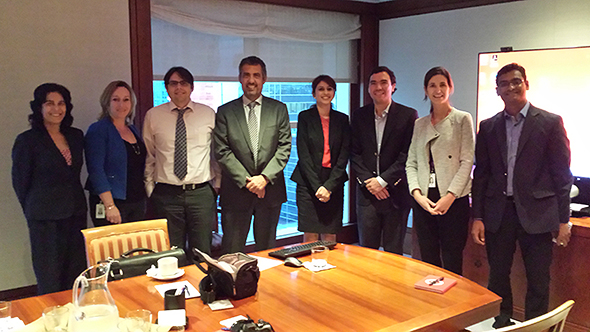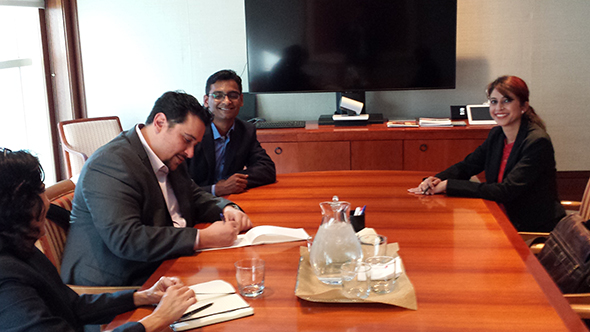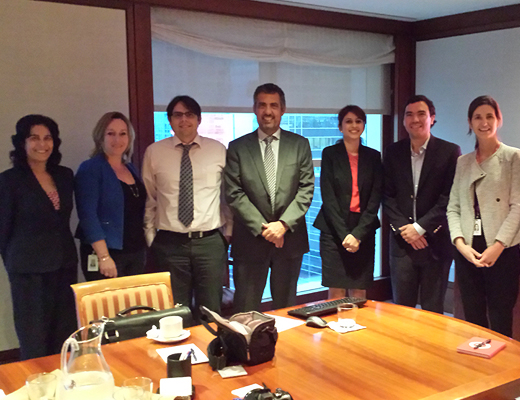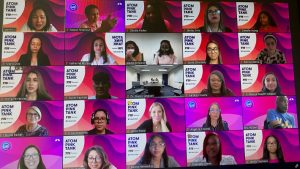
While they study analytics every day, it’s rare that students in FIU’s Information Systems and Business Analytics Department (ISBA) have the chance to work with massive real-world financial data. That’s why global financial giant Banco Santander’s first Santander NEO´s Challenge, an international university competition, posed an incredible opportunity to put their classroom knowledge to a professional test.
An FIU team, nicknamed the Data Panthers, took up the challenge. Weeks of hard work and complex problem solving paid off. The Madrid-based bank named the Data Panthers as the U.S. winner of the challenge. They now travel to Madrid in mid-March for the final round, matching wits against teams from Argentina, Chile, Spain, Mexico, Portugal.
“We’re super excited,” said Ph.D. candidate Arturo Castellanos. Joining Castellanos on the team were graduate students Ina Thakur and Gopala Krishna Medisetti, along with doctoral candidate Alfred Castillo. All team members belong to the Association for Information Systems student organization.
The opportunity arose after Aurora G. Morcillo, director of FIU’s Spanish and Mediterranean Studies program, learned of the challenge, relaying the info to ISBA department chair Monica Chiarini Tremblay, who asked Gladys Simpson to get involved in her role as AIS faculty advisor.
The Madrid-headquartered bank asked participants to figure out, using millions of its transactions and other raw material, what elements predict a customer will either stay active, or become non-active.

Using business IT training to take on a challenge.
The task wasn’t easy. Santander asked teams to query and analyze the data to isolate predictive elements underlying whether or not customers would remain active. The bank provided data (but not personal information) on 1.9 million customers.
“What we did (first) was try to figure out what the business problem is – that is one of the reasons they would approach a business school,” Castellanos said. “We invested a lot of time and energy in really understanding what the problem was, and the data we had at hand, which leads to the methodologies we use and the kind of models we can create.”
The data presented more than 160 transaction attributes – think age, city, deposit size, average line of credit and so forth.
“Some attributes are more important than others,” Castellanos said. In the end, the team came up with a core set that included income level, the number of products customers had (loans, credit lines, etc.) and account balance to predict who would become inactive.
Membership inspired Teamwork
“The project truly pushed the boundaries of their knowledge,” said Simpson, an ISBA instructor. She emphasized that working closely with ISBA Senior Instructor Nicole Wishart, who functioned as faculty advisor, was a huge bonus. “They were able to be mentored by faculty in a way rarely experienced in the regular classroom, given the complexity of the case–particularly the size of the data base used in the project.”
Castellanos said that they couldn’t have done it without the support of the entire department, including the IT staff that dedicated one server to the project.
And, he said, winning aside, the chance to luxuriate in so much information was not to be missed. “We teach students with limited samples of data so they can grasp the concepts,” he said, noting that big businesses are very conservative when it comes to sharing data. “For analyst people, it’s a real world thing, it’s data heaven.”
After their victory, Data Panthers team members and FIU ISBA faculty had the opportunity to visit in the Miami office of Banco Santander, meeting with Javier Rodriguez Hergueta, the bank’s senior vice president and business intelligence director, and Maria Gisbert, director of marketing. They shared the outcomes, opportunities and lessons learned from their participation in the Santander business analytics challenge.
“This exposure to a real world application of big data analytics was an amazing experience for students,” Castellanos said. “We appreciated the opportunity to learn more about using analytics to solve business problems in the banking industry.”





